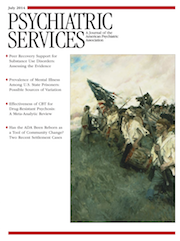Misalignment Between Medicare Policies and Depression Care in Home Health Care: Home Health Provider Perspectives
Abstract
Objective
Depression affects one in four older adults receiving home health care. Medicare policies are influential in shaping home health practice. This study aimed to identify Medicare policy areas that are aligned or misaligned with improving the quality of depression care in home health care.
Methods
This qualitative study was based on semistructured interviews with nurses and administrators from five home health care agencies in five states (N=20). Digitally recorded interviews were transcribed and analyzed by using the grounded theory method. A multidisciplinary team iteratively developed a codebook from interview data to identify themes.
Results
Several important Medicare policies are largely misaligned with depression care quality improvement in home health care. Medicare eligibility requirements for patients to remain homebound and to demonstrate a need for skilled care restrict nurses’ ability to follow up with depressed patients for a sufficient time. Lack of explicit recognition of nursing time and quality of care in the home health prospective payment system provides misaligned incentives for depression care. Incorporation of a two-item depression screening tool in Medicare-mandated comprehensive patient assessment has raised clinician awareness of depression; however, inclusion of the tool at the start of care only but not at other follow-up points limits its potential in helping nurses manage depression care. Underdevelopment of clinical decision support for depression care in vendor-developed electronic health records constitutes an important barrier to improvement of depression care.
Conclusions
Several influential Medicare policies and regulations for home health practice may be misaligned with evidence-based depression care for home health patients.



